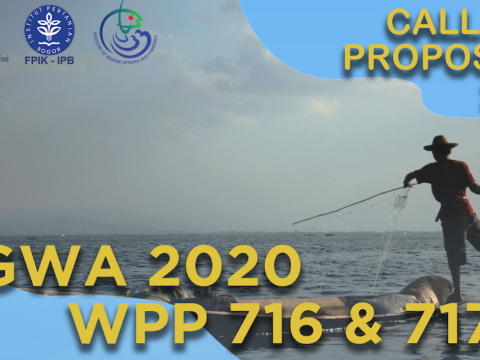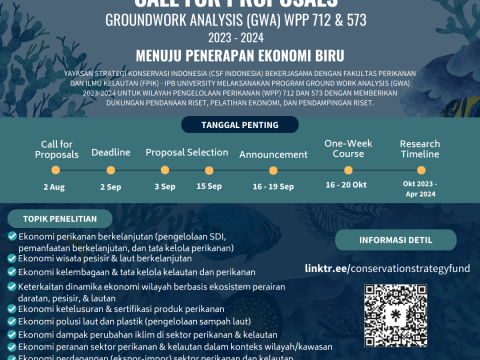Fifth Groundwork Analysis Kicks Off: Exploring the Blue Economy Development Framework in The FMAs 712 & 573 Through the Economic, Marine & Fisheries Policy Training
|
|
The Fifth Iteration of CSF’s Groundwork Analysis (GWA) Fellowship Program Has Launched
This year’s program focuses on two fisheries management areas (FMAs) - 712 and 573 - in central Indonesia, where our fellows will be researching solutions to some of Indonesia’s most important conservation challenges.
In 2023, CSF Indonesia together with the Fisheries and Marine Science Faculty of IPB University (FPIK IPB University) launched the fifth Groundwork Analysis (GWA) Fellowship Program. In its fifth iteration, it has expanded its horizons to encompass the Fisheries Management Areas (FMA) of 712 and 573 in central Indonesia, casting a wide net over the seas that are so vital to Indonesia's livelihood. After a rigorous selection process, the two institutions handpicked six consortia, and an additional one from Sintang Regency, West Kalimantan Province, to undertake pioneering research in these areas on inland fisheries governance.
FMA 712 covers the Northern Sea of Java Island, and FMA 573, stretches across the South Indian Ocean of Java Island, South Nusa Tenggara, Sawu Sea, and the Western part of Timor Sea. These valuable marine ecosystems are the uncharted territories where the magic is set to happen. This initiative is no fleeting affair, and it's poised to be a game-changer for Indonesia's marine and fisheries sector.
Unlocking the Future of Indonesia's Marine and Fisheries: A Journey of Discovery
This October, as part of the GWA program, CSF Indonesia and FPIK IPB University held a one-week economic course in Yogyakarta to introduce economic tools for conservation to key stakeholders surrounding the FMA. One of the objectives was to improve the capacity of our fellows and participants for a better understanding of the economic benefits possible with conservation-focused sustainable development in Indonesia.
A diverse cohort of 32 participants from government institutions, universities, and civil society organizations attended the course in Yogyakarta. ost of the participants were subnational policymakers within the FMA 712 & 573.
CSF welcomed partners from our other sustainable development initiatives to join this training. We included participants from the Sintang Regency which is currently doing Groundwork Analysis research on Sintang Inland Fisheries. Within this training, we have also enacted a multi-disciplinary participatory to further expand our transfer of knowledge to every level of stakeholders.
Through this course, we trained participants in economics tools to strengthen Indonesia’s Marine and Fisheries programs. We used a combination of exercise, study case, and in-class methods to help our participants gain an in-depth understanding of economic conservation for better decision-making. This proved to be an effective strategy in delivering our economic tools to participants from various backgrounds. As we can see, the course made an impact on its participants:
Odjastira Vidyastari from Bali Marine and Fisheries Agency exclaimed, "On this training, I've learned more about the relationship between nature, economy, fishery, environment, conservation, etc. Getting to know people from different regions and receiving new experiences, as this is my first ever training."
Mang Yayi Jabawidhiarta from the Special Region of Yogyakarta Development Planning Agency found it incredibly useful, stating, "I find the training is useful; as a planner, I've come to understand how to govern sustainable marine resources."
Tanti Harlianti from West Java Development Planning Agency described the course as "really fulfilling," stating, "I've learned a lot about natural resources, environment, economy, and analysis on policymaking that institutions needed."
This course wasn't just about learning; it was about igniting a sense of commitment. An ingenious game called "commitment eggs" demonstrated the dedication of each of the participants present. It created an atmosphere of camaraderie and openness within the cohort, laying the groundwork for a profound connection between the participants and CSF.
As the participants left the course, they didn't just carry newfound knowledge and experiences; they carried with them a profound sense of responsibility. Their commitment was a promise to be the architects of change. In the years to come, these alumni are poised to be the torchbearers, lighting the path towards a brighter, more sustainable future for Indonesia's marine and fisheries sector.
This work is made possible by the generous support of Margaret A. Cargill Philanthropies and the Walton Family Foundation.
- Log in to post comments


